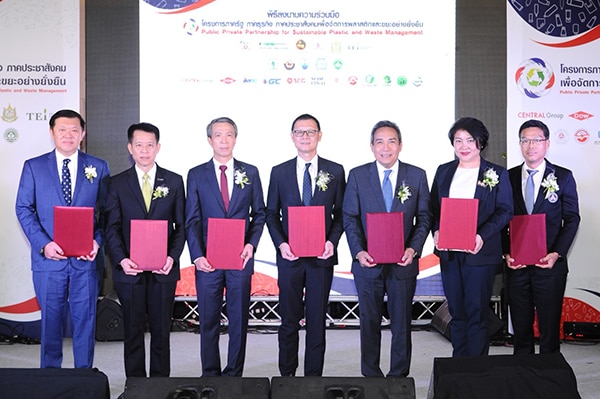Bangkok - June 05, 2018 - Being ranked 6th out of 192 countries as the major contributor of ocean debris, Thailand’s ocean waste remains an unresolved critical issue. Data shows that within the country’s 23 coastal provinces there is approximately 11.47 million tons of waste, more than 14 per cent of which (about 1.55 million tons) is plastic. More importantly, 10-15 per cent (340,000 tons) of the plastic debris is in danger of leaking into the ocean, inflicting significant harm to marine lives and overall ecosystem1.
1 http://www.dmcr.go.th/detailAll/13479/nws/87/
Recognizing the importance of the issue, Plastic Industry Club, The Federation of Thai Industries, Thailand Business Council for Sustainable Development (TBCSD), and Thailand Environment Institute Foundation have launched “Public Private Partnership for Sustainable Plastic and Waste Management” project declaring their intention and commitment to collaboratively drive the initiative for at least five years. The goal is to reduce ocean waste in Thailand for no less than 50 per cent by the year 2027 by implementing sustainable plastic and waste management and adopting Circular Economy principle with supports from 20 organizations from public, private, and civil society.
The partnership comprises of public sector, private sector, and the civil society.
The public sector: Bangkok Metropolitan Administration (BMA), Pollution Control Department, Department of Marine and Coastal Resources, Ministry of Natural Resource and Environment, Department of Local Administration, Ministry of Interior and Plastic Institute of Thailand, Ministry of Industry.
The private sector: The Federation of Thai Industries, Thailand Business Council for Sustainable Development (TBCSD), Central Group, Dow Thailand Group, IRPC PCL, PPT Global Chemical PCL, SCG Chemicals Co., Ltd., Siam Piwat Co., Ltd., and Thai Plastic Industries Association.
Civil society and international organizations: Thailand Environment Institute Foundation, Thai Creation Society, and International Union for Conservation of Nature and Natural Resources (IUCN).
“Public Private Partnership for Sustainable Plastic and Waste Management” project aims to work with all sectors to reduce plastic waste in Thai oceans to no less than 50 per cent by the year 2027 and encourage the adoption of Circular Economy
principle for managing plastic. The initiative will help promote the standard of recycling business, support entrepreneurs to develop innovation and technology for sustainable plastic management using 3Rs (Reduce, Reuse, Recycle) principle, educate consumers and the public about the proper disposal of waste and waste management and encourage behavioral changes, pilot a clean city model in Khlong Toei District, Bangkok, and in Rayong Province, develop Thailand Plastic Material Flow Database to measure the project’s success and serve as an internationally-accepted plastic database for Thailand.
Suphan Mongkolsuthree, Chairman, Federation of Thai Industries (FTI), said, “This project is an important step taken to sustainably manage plastic and waste in Thailand. It is the first time that public sector, private sector, and civil society have partnered to declare their intention and commitment with supports from 177 companies in the industry sector. The purpose of this partnership is to engage since the stage of plastic design, the modification of production, reduction of plastic use, and the increase of reuse and recycling rate to enhance the value of recyclable and degradable plastic. The goal is to achieve tangible results in plastic and waste management along the supply chain.”
Prasert Bunsumpun, Chairman, Thailand Business Council for Sustainable Development (TBCSD), said, “Plastics are reusable and valuable resources that can create values within the Circular Economy principle. Waste management of plastic resources requires participation from all parties, not only plastic manufacturers. All sectors must be involved. Plastics are a key player in various businesses, particularly in packaging, and sustainable plastic management is in line with our policy. This project is an important step for Thailand to solve plastic problems in a sustainable and integrated way.”
Suwanna Jungrungrueng, Deputy Permanent Secretary, Bangkok Metropolitan Administration, said, “Currently, our office can collect approximately 80 million plastic bags per day. In Bangkok, a person uses an average of eight plastic bags per day. It has been discovered that the issue stems from people immediately disposing plastic bags after a single use. While landfill costs THB 700 per ton and the landfill area is getting inadequate, it is time for all parties to work together to reduce a single use of plastic in order for it to be recyclable leaving no debris in the environment.”
Dhana Yantaragowit, Deputy Director, Department of Local Administration, Ministry of Interior, said, “We are collaborating in this project to educate the local communities for behavioral changes and to correct their perception about organic waste for waste segregation. We will also support and uplift the standard of SMEs in recycling business and host trainings for officers to have better understanding of their work.”
Somchai Masathian, Chief of Inspector General, Ministry of Natural Resources and Environment, said, “Sustainable plastic management starts from creating consciousness, building awareness, and adjusting behaviors in waste segregation among the youth and supporting environmentally friendly innovation. Most environmental problems are caused by plastics mainly bags, straws, bottles, caps, and food containers which resulted in ocean wastes causing problems to the ecology, tourist attractions, marine lives, and the economic as a whole.”
Somboon Yindeeyoungyuen, Deputy Permanent Secretary, Ministry of Industry, said, “Sustainable plastic and waste management requires commitment from all sectors. Entrepreneurs must open up to new knowledge in bringing innovation to help increase the value of plastic waste. The Ministry is ready to help provide the body of knowledge and consultation to participating agencies to practically implement the Circular Economy principle.”
Narong Boonyasaquan, Acting President, Thailand Environment Institute, said, “The Foundation aims to support both public and private sectors to achieve sustainable goals. We join this project to declare our intention in hope that the collaboration will expand to wider areas for all to help manage, solve, and prevent environmental issues in the future.”
The implementation of this project presents a commitment of cooperation of all sectors in order to effectively solve the problem of waste and sustainable use of plastics.

